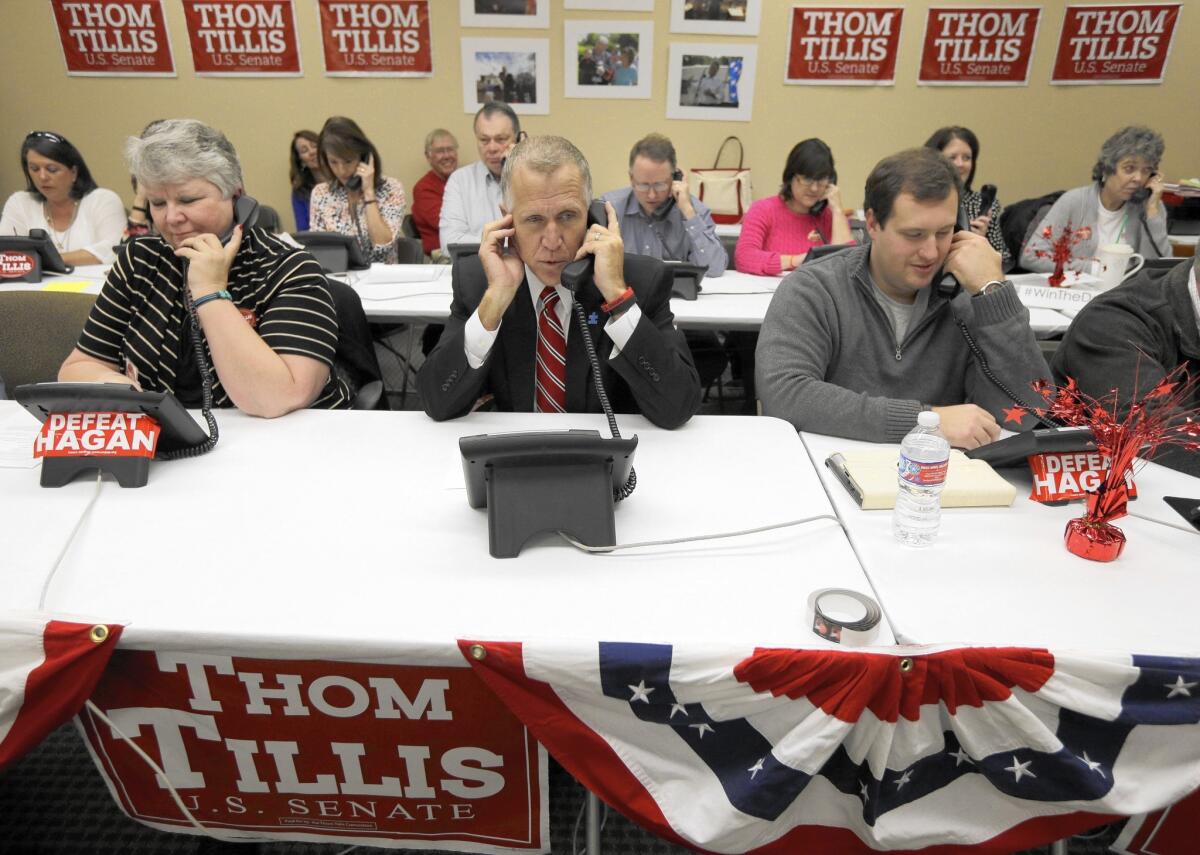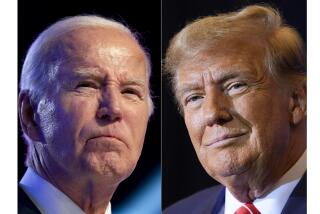Cheat sheet: 10 states to watch in the battle for the Senate

Tuesday’s election brings to an end a multibillion-dollar barrage of promises, threats, hysteria and retribution known collectively as the 2014 midterms.
Traditionally, such elections are the out-party’s opportunity for payback against the party in power, and rarely has that been as true as it is this year, when President Obama’s unpopularity has made Republicans optimistic about winning control of the Senate and extending their domain in the House.
Republicans need a net gain of six Senate seats to take control; they are expected to add to their 33-seat margin in the House.
Here are some states to watch Tuesday night:
New Hampshire: Scott Brown is trying to pull off the rare feat of winning a U.S. Senate seat in two different states. After his 2012 defeat in Massachusetts, he moved to New Hampshire and has brought his campaign to nearly every diner in the Granite State. If Democratic incumbent Jeanne Shaheen falls, it could be an early night for Democratic hopes.
North Carolina: Sen. Kay Hagan long topped lists of Democrats unlikely to survive; her state didn’t go Democratic in 2012 even under more favorable conditions. Still, she has a slight edge in preelection polls, despite tens of millions of dollars in negative ads raining down on her. Her umbrella: tens of millions in ads aimed at Republican Thom Tillis from Hagan’s Democratic allies. All told, more than $100 million will have been spent in this small state, an indicator of its outsized importance in 2014.
Kentucky: For some time Republican Mitch McConnell was in the uncomfortable position of potentially losing his Senate seat just as Republicans won enough contests nationally to hand him the post of Senate majority leader. Recently, though, he has maintained a small lead, helped along by a well-run GOP campaign and Democrat Alison Lundergan Grimes’ repeated refusal to say whether she voted for President Obama.
Colorado: Ground zero in many ways, the state boasts tight Senate and governor’s races as well as a competitive House race in the Denver suburbs. Perhaps nowhere did Democrats more forcefully push their argument that Republicans were warring against women, and a loss by Sen. Mark Udall to Rep. Cory Gardner would send shivers through the Democratic hierarchy in advance of the 2016 presidential contest. Also down to the wire is the governor’s race, featuring Democratic incumbent John Hickenlooper and Republican Bob Beauprez. One complication: This is the first all-mail election in the state, which could alter turnout.
Kansas: News has not been as good for Republicans in this state, where Gov. Sam Brownback has faced a backlash over budget cuts and Sen. Pat Roberts is trying to beat back an independent candidate after being dirtied up early on over his lack of a home-state home. The Republicans’ fates will show whether it’s possible for the GOP to go too far, even in a red state, and the perils for a candidate of going Washington in a sharply anti-Washington year.
Georgia: Like Colorado, this is a site of competitive governor and Senate races. In both cases, Democrats were boosted by family ties — former President Carter’s grandson Jason is the gubernatorial candidate and Senate candidate Michelle Nunn is the daughter of longtime Democratic Sen. Sam Nunn. Nunn has also been helped by outsourcing accusations leveled against her Republican opponent, David Perdue. However, to win Tuesday would mean capturing more than 50% of the vote; otherwise, candidates head to a January runoff.
Iowa: Spoiled by attention each presidential cycle, Iowa has been in the bright lights this year as well. Republican Senate candidate Joni Ernst defined her toughness early on by airing an ad on her past experience castrating hogs. Bruce Braley, a Democrat, gained early fame by appearing to criticize farmers. Ernst’s strategy appears to be working better, not surprisingly; Braley trailed in a final Des Moines Register preelection poll. No such dramatics in the race for governor, which GOP veteran Terry Branstad has led wire to wire.
Alaska: But for potential runoffs in Louisiana and Georgia, the Last Frontier might well be the last to count votes, so late do its ballots come in. Democratic Sen. Mark Begich was trying to fend off Republican Dan Sullivan, with Begich helped not at all by Obama’s deep unpopularity in the state. Also up in the air: a novel unity challenge featuring independent Bill Walker and Democrat Byron Mallott, working together to try to knock off GOP incumbent Gov. Sean Parnell.
Louisiana: Like her fellow legacy Democrat in Arkansas, Sen. Mark Pryor, Louisiana Sen. Mary L. Landrieu has been fighting uphill to retain her seat, with this twist: Should Senate control come down to Louisiana’s results, all parties will have to stew until early December. Barring a big GOP sweep that energizes Republican Bill Cassidy, it appears that no candidate will exceed 50% on Tuesday, which will trigger a runoff scramble.
Florida: A true race to the basement, the contest for Florida governor featured two candidates who generate eye rolls as much as applause: the incumbent Republican, Rick Scott, and Republican-turned-independent-turned-Democrat Charlie Crist, who served as governor while a member of the GOP. All the strangeness of the race boiled down recently to this: Scott refused to come on stage for a televised debate because he objected to a fan Crist had brought in, leaving the moderator and Crist to fumble on air for several long minutes before Scott relented. It’s been lots of hot air — before and since.
More to Read
Get the L.A. Times Politics newsletter
Deeply reported insights into legislation, politics and policy from Sacramento, Washington and beyond. In your inbox three times per week.
You may occasionally receive promotional content from the Los Angeles Times.







